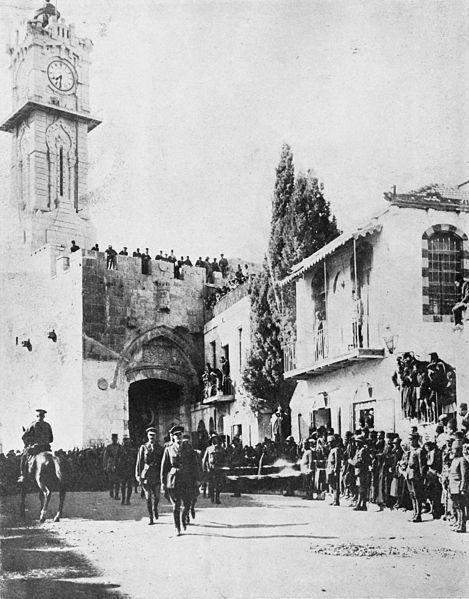On this day he entered Jerusalem, modestly on foot, two days after the Turks surrendered it, after several attempts.
By David B. Green | Dec. 11, 2014 | 3:46 AM from Haaretz

General Allenby entering Jerusalem on foot out of respect for the holiness of the city, December 11, 1917. Photo by Wikimedia
In December 11, 1917, General Edmund Allenby, commander of the British “Egyptian Expeditionary Force,” entered Jerusalem, two days after the Turkish forces occupying the city raised the white flag before Allied forces. Understanding the symbolic sensitivity of Jerusalem to both its residents and religious adherents the world over, Allenby, who was later described by T.E. Lawrence as “morally so great that the comprehension of our littleness came slow to him,” elected to make his entrance through Jaffa Gate on foot. This was in intentional contrast to Kaiser Wilhelm II, who, visiting the Holy Land in 1898, insisted on entering the Old City seated on a white horse.
After taking up his command in Cairo in June 1917, Allenby had been given explicit orders by Prime Minister David Lloyd George to capture Jerusalem by Christmas. This was in the wake of two failed efforts by his predecessor, Sir Archibald Murray, to conquer Gaza, a necessary condition for the conquest of Palestine from the Ottoman Turks.
Allenby began by defeating Turkish forces in the Third Battle for Gaza, which ended on November 7. Following that, he sent out forces along two flanks, one charged with capturing Jaffa, a mission accomplished on November 16, and the other in the direction of Jerusalem.
An initial attempt to surround the city and force its surrender, at the end of November, failed. But on December 7, having repositioned the troops of the British XX Corps, the Turkish forces in the city concluded that Allenby was withdrawing, and relaxed their defense of Jerusalem.
I don’t want Jerusalem, I want eggs
In his book “Jerusalem Curiosities,” Abraham Ezra Millgram quotes at length from Vivian Gilbert’s “The Romance of the Last Crusade: With Allenby to Jerusalem,” which describes the multiple attempts that the rulers of the vanquished city had to make before they could find someone among the conquerors who was authorized and willing to accept Jerusalem’s surrender.
The first to be offered Jerusalem was “Private Murch,” a British cook bivouacked in the north of the city, who had been sent on December 9 by his commanding officer to the nearby village of Lifta to find some eggs for breakfast. When Murch was approached by the mayor of Jerusalem, on horseback and flying a white flag, offering to turn over the keys to the city, Murch replied, “I don’t want yer city. I want some eggs for my hofficers!”
Nonetheless, Murch reported the development to his superiors, and Brig.-Gen C.F. Watson hurried off in the direction of town to accept its surrender from its mayor, Hussein Salim al-Husseini. However, when the divisional commander, Maj.-Gen John Shea, learned of this development, he got on the field phone and order that Watson be stopped: “I will myself take the surrender of Jerusalem!”
So he did, after Watson had ridden back to town to return the keys to Husseini. Then when Shea wired General Allenby the good news, the latter wrote back that he would be arriving in two days to accept the city’s surrender.
Gaston Bodart, Austria’s official historian of the Great War, wrote that the moral significance of Jerusalem’s capture “was even greater than its military importance.”
Allenby understood this. In declaring martial law in the city, he promised that “every sacred building, monument, holy spot, shrine, traditional site, endowment, pious bequest, or customary place of prayer of whatsoever form of the three religions will be maintained and protected.” And, as noted, he was careful to dismount from his horse before entering Jaffa Gate.
Prime Minister Lloyd George described the capture of Jerusalem as “a Christmas present for the British people.”
It is said that a Jewish Allied soldier from New Zealand, Corporal Louis Isaac Salek, hung a blue-and-white flag, decorated with the Star of David from the Tower of David. He had ordered the flag from the Jewish haberdasher Moreno Cicurel, of Cairo, who had it made by a tailor named Eliezer Slutzkin. Within 20 minutes, the British had removed the flag.
